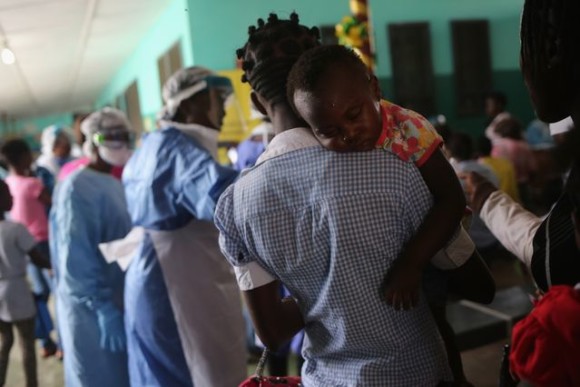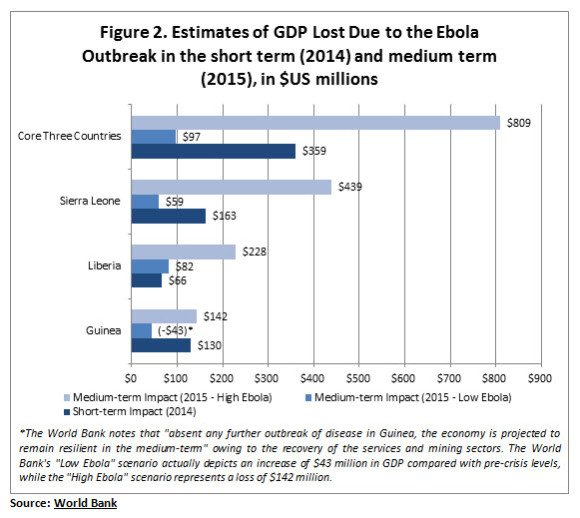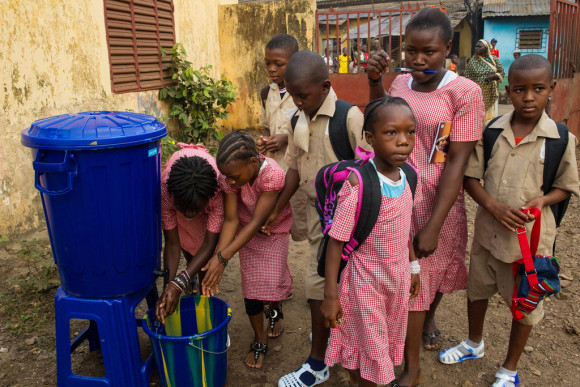As the birthplace of human beings and the subsequent birthplace of disease, Africa faces hurdles unlike any other cotenant (PSU, WC 2015). In addition to its AIDs epidemic and other crippling diseases such as plague, syphilis, and malaria, the latest Ebola outbreak has tested not only Africa’s resolve but also the worlds. As of April 8, 2015, the World Health Organization has reported over 25,556 cases and 10,600 deaths as a result of the Ebola Virus (BBC News). Aside form human suffering; this outbreak centered in Liberia, Sierra Leone, and Guinea, has greatly impacted the continent, and the world. Borders closed, mining and food production has been affected, and even the African Cup of Nations, the countries premier football event was impacted (The Economist, 2014).
To keep the virus from spreading, mobility was restricted not only within the country but also internationally. This has greatly impacted trade and workers going to and from work which in turn impacts production and revenues. Fear and travel bans implemented by many airlines have had a devastating affect on tourism which brought over 36 million visitors to the country and was rising by 6% a year before the outbreak (The Economist, 2014). Also impacted because of travel restrictions, agriculture took a hard hit as road blocks prevented workers and supplied from getting to the fields. Sierra Leone’s Agriculture Minister Joseph Sam Sesay told the BBC that “The economy has been deflated by 30% because of Ebola,” and quoted the The President, Ernst Bai Koroma as having told his ministers that “The agricultural sector is the most impacted in terms of Ebola because the majority of the people of Sierra Leone, about 66%, are farmers.” Home to the world’s largest steelmaker and abundant iron ore, mining, which makes up 14 and 17 percent of Liberia’s and Sierra Leone’s economy respectively, has also been hit hard(Hamilton, 2014). This is not only because of the restriction on travel but because investors are scared and either pulling out or scaling down investments. While the companies have scaled down production and pulled out most expatriate workers, thankfully many have been able to donate money towards aid in Africa.
All of these challenges present fiscal ramifications that have reduced government revenues in forms of taxes, tariffs, and customs duties. The World Bank stated that “the largest economic effects of the crisis are not as a result of the direct costs (mortality, morbidity, caregiving, and associated losses to working days) but rather those resulting from aversion behavior driven by fear of contagion. This in turn leads to a fear of association with others and reduces labor force participation, closes places of employment, disrupts transportation, and motivates some government and private decision-makers to close sea ports and airports.” The chart below shows their predictions on GDP loss for 2015 (Hamilton, 2014):
It is difficult to fully measure the impact Ebola will ultimately have on Africa and the world. Much progress had been made in Africa prior to the outbreak and hopes are that the progress will not be lost after Ebola is managed. The World Bank Group, with the Liberia Institute of Statistics and Geo-Information Services (LISGIS) and the Gallup Organization have been conducting mobile phone surveys in order to monitor the socio-economic impact of the Ebola outbreak on households. Their findings after their 5th survey in March 2015 found that the employment situation in Liberia has steadily improved but that 40% of respondents were still not working. About 65% of farmers reported that their crops yielded a smaller harvest last year and although improving, food insecurity is high with close to 75 percent of households reporting that they were concerned about having enough to eat (Himelein, 2015). With schools being closed 3-6 months, Time (2014) reported that in December that % million children were not in school due to Ebola. Many children have lost out on moths of education and many may not return because of the need for them to work. The World Bank survey has found that the use of public services, especially schools, is rebounding as three-quarters of children in households surveyed have returned to school (Himelein, 2015).
In its latest report, the World Health Organization has declared both Nigeria and Senegal outbreak free. Liberia was close to the same report when a single case was confirmed on March 20, day 27 of the 42 day countdown that would allow it to declare it over. Sierra Leone has had 55 new cases and Guinea is at 95 cases (Belluz, 2014). Progress is being made, children are going back to school, farms are again being manned, and there is hope of declaring many regions outbreak free soon. The world reacted to this epidemic by sending aid which have resulted in lessons learned that have created improvements in public health policies and even fast tracked the creation and testing of potential cures and vaccines. If anything, the world has seen the importance of investing in pandemic preparedness (The World Bank, 2015).
References
BBC News. (2015, April 13). Ebola: Mapping the outbreak. Retrieved from http://www.bbc.com/news/world-africa-28755033
Belluz, J. (2015, March 23). Remember the Ebola epidemic? It’s still not over. Vox. Retrieved from http://www.vox.com/2015/1/12/7532755/Ebola-epidemic-end
Hamilton, R. (2015, August 21). Ebola crisis: The economic impact. BBC News. Retrieved from http://www.bbc.com/news/business-28865434
Himelein, Kristen. (2015). The socio-economic impacts of Ebola in Liberia: Results from a high frequency cell phone survey (5). Retrieved from World Bank Group website: http://www.worldbank.org/content/dam/Worldbank/document/Poverty%20documents/Socio-Economic%20Impacts%20of%20Ebola%20in%20Liberia%2C%20April%2015%20(final).pdf
Pen State World Campus. (2015). Leadership in a global context. Retrieved from https://courses.worldcampus.psu.edu/sp15/olead497b/001/content/14_lesson/01_page.html
Sifferlin, A. (2014, December 17). Saving education during ebola. TIME. Retrieved from http://time.com/3637570/5-million-kids-arent-in-school-because-of-ebola/
The Economist. (2014, November 15). Economic consequences of Ebola: The ignorance epidemic. Retrieved from http://www.economist.com/news/middle-east-and-africa/21632641-virus-claiming-new-victimsafrican-tourism-and-football-ignorance
The World Bank. (2015, January 20). Ebola: Most African countries avoid major economic loss but impact on Guinea, Liberia, Sierra Leone remains crippling. Retrieved from https://www.worldbank.org/en/news/press-release/2015/01/20/ebola-most-african-countries-avoid-major-economic-loss-but-impact-on-guinea-liberia-sierra-leone-remains-crippling




Leave a Reply
You must be logged in to post a comment.